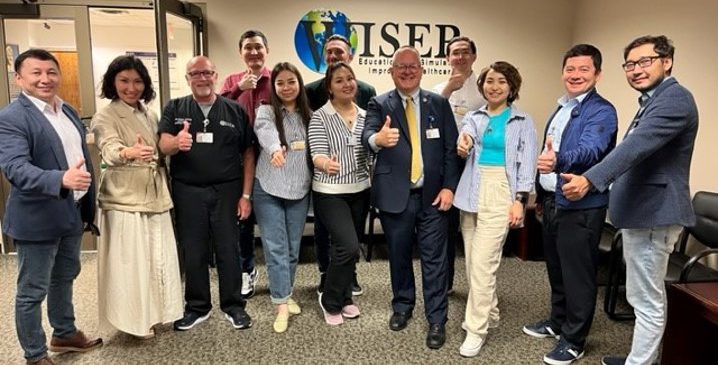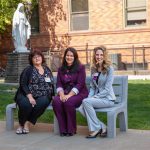This year, UPMC welcomed 50 clinicians and leaders from Nazarbayev University Medicine (NU Medicine) in Kazakhstan to Pittsburgh to participate in the UPMC Mentorship Program, an observational program that aims to help NU Medicine develop the first academic medical center in Central Asia.
For one month, the mentees engaged with clinical and administrative experts at UPMC Passavant, UPMC Children’s Hospital of Pittsburgh, UPMC Mercy, UPMC Magee-Womens Hospital and other locations. They learned how UPMC designs and delivers cutting edge health care with exceptional patient experience.
“Our partnership with Nazarbayev University allows us to bring UPMC’s style of care closer to patients around the world,” said Dr. Matthew Harinstein, senior vice president, chief operating officer, associate chief medical officer, UPMC International. “We have our UPMC Traveling Patient Services program, which helps bring patients to Pittsburgh for advanced care. Also, we want to export our expertise by training physicians to implement our key tactics that can lead institutions as they continue to advance,” said Harinstein. The goal of the UPMC Mentorship Program is to optimize clinical and research practices to enable NU to become a health care destination for people in Kazakhstan and surrounding countries.
The Beginnings of a Partnership
In 2013, UPMC began a relationship with Nazarbayev University, two years before Michelle Sriprasert, senior director, Kazakhstan Operations, UPMC International, joined the team. “In 2018, we began to focus on helping them develop and integrate an academic medical center, NU Medicine,” she said. “We brought about a dozen executives and staff from UPMC to Astana, Kazakhstan, for a three-day workshop with their department leaders.”
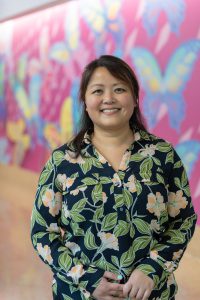
Michelle Sriprasert, senior director, Kazakhstan Operations, UPMC International
“We started with their organizational structure, as they had several hospitals under NU that functioned as separate entities,” said Sriprasert, who explained that University Medical Center (UMC) is the name used for their hospitals. “We wanted to streamline those organizations and governance structures.”
Dr. Yuriy Pya, the chairman of the board of UMC and founder of the renowned National Research Cardiac Surgery Center, the most recent addition to the NU health system, greatly supported the initiative. “He would say it took 10 to 15 years of travel to open his mind, and he recognized that a change in the mindset of his staff was necessary in order for the organization to advance,” said Sriprasert. In Kazakhstan, a physician who works on research and education while also treating patients is a foreign concept, so it was important to Pya that his team see it in action.
Developing a Schedule
Each leader and clinician, including physicians and nurses, received a personalized experience, with a mentor to help tailor their schedule, learning objectives and more. On the day each cohort arrived, the International Training Center (ITC) spent the day orienting them. “With the help of Michelle and her team, we created preceptor guides about expectations and cultural differences they may experience,” said Susan Gallant, director, UPMC International Training Center.
On Mondays, the mentees had didactics and field trips that helped them learn about the system. They visited the Wolff Center, Peter M. Winter Institute for Simulation, Education and Research (WISER) and other locations. On Tuesday through Thursday, mentees attended sessions organized by their mentors to observe job roles throughout the system. On Friday, they learned about clinical research topics in-depth. During the observations, each mentee developed a three-year roadmap for the transformation of UMC into an academic medical center.
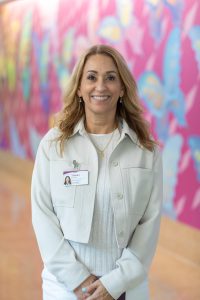
Susan Gallant, director, UPMC International Training Center
“We wanted the mentees to learn about the differences in styles of care between our countries, developing a list of concepts or ideas they would like to implement when we reach the next phase of partnership,” said Harinstein, who believes the first changes they’ll make will focus on time management and work schedules. “In Kazakhstan, they work long hours, and at UPMC, they were able to see how physicians work in an academic environment while balancing their home life, clinical duties, and research.”
“With the help of many people across the system, we hosted classes on difficult conversations, unconscious bias, and how to be change ready leaders,” said Gallant. “We wanted them to look internally to ask: How am I as a leader? Do I look at the whole story? How do I move the needle forward when I return home?” They placed an emphasis on UPMC’s culture of safety.
Fondly, Harinstein remembered a day when he gave a presentation to the cohort about UPMC Values that went over by double the intended meeting time. “At the conclusion, the cohort asked if they could take a picture with me,” he said. “To me, this memory demonstrates their interest in growing as physicians, their pride in what they do and their appreciation. Their enthusiasm highlights why this is a successful partnership.”
The Heart and Vascular Institute at UPMC Passavant: A Well-Coordinated Orchestra
Among many others, Harinstein mentored Dr. Alexey Goncharov and Dr. Abdurashid Mussayev, two interventional cardiologists. Before their arrival, Harinstein, who is also a cardiologist, met with his mentees to develop a month-long curriculum that met their goals and fit their interests. “We wanted to give them experience that would be valuable in facilitating future engagement with UPMC and UMC in Kazakhstan,” said Harinstein. “Dr. Mussayev and Dr. Goncharov looked to develop a heart and vascular service line that aligned with what we do at UPMC.”
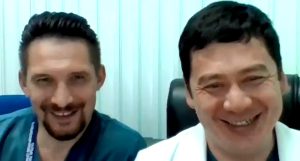
Left, Dr. Alexey Goncharov, interventional cardiologist. Right, Dr. Abdurashid Mussayev, interventional cardiologist
They visited UPMC Passavant to learn from their Heart and Vascular Institute. “At UPMC Passavant, we observed procedures related to coronary, structural, and congenital heart disease and interventions,” said Mussayev.
Mussayev found himself intrigued by the pre and post procedure care that each patient receives. “What was most significant was not to see what they do, but how they do it,” he said. “The Heart and Vascular Institute at UPMC Passavant functions like a well-coordinated orchestra.” He described how each member of the various departments understand their roles and perform them with a high degree of efficiency and professionalism/
Among many physicians and medical experts, Mussayev and Goncharov shadowed Tim Powell, clinical director, Cardiovascular Services, UPMC Passavant, who they remembered created a comfortable environment where they could learn openly and ask questions.
With Powell, the mentees were able to observe what he does every day at UPMC Passavant. “In my role, I do invasive and noninvasive procedures, from electrophysiology labs and interventional radiology to echo, stress testing, EKG and cardiac rehab,” said Powell. “I work on the flow between the service line and UPMC Passavant through inpatient and outpatient testing and procedures with my team.”
“The mentees were very receptive and patient,” said Powell. “I took them through the inpatient floors. They were comfortable going into departments, meeting people, and asking good, hearty questions.” He found that they were most inquisitive about the role nurses play in our health system. “I wanted to teach them how our service line is structured through different tiers of nursing and education available to us.”
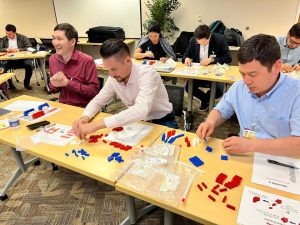
“I’ve worked in cardiology for 34 years, and I love how you get to see the impact of the care you provide immediately, whether it be caring for a person with chest pain or suffering a heart attack,” said Powell. According to Powell, what makes cardiology at UPMC Passavant most special is how the team is always innovating. “Sometimes, that makes my role positively challenging as I continue to explore how UPMC Passavant will continuously elevate as a center of excellence that offers people in our northern communities close to home access to the highest levels of specialty care.”
“The clinical, educational and research-oriented focus at the Heart and Vascular Institute was truly amazing,” said Goncharov, who was able to dive deeper into his interest in coronary heart disease. “We were able to meet with several physicians and nurses, thanks to the coordination of Dr. Harinstein.”
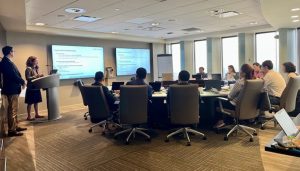
Harinstein, Mussayev and Goncharov found themselves noticing the differences between the two health systems as well. “As I worked with Dr. Mussayev and Dr. Goncharov, along with many other individuals from the five cohorts, I had the opportunity to learn more about their country and how we could offer different perspectives,” said Harinstein.
Both Mussayev and Goncharov emphasized the differences in health care delivery. “UPMC is focused on education, which provides structure to their medicine and an advantage to the level of care provided,” said Mussayev. He was surprised by the opportunities available to nurses at UPMC. “They have a great deal of responsibility compared to nurses in Kazakhstan. UPMC places an emphasis on their accomplishments and prepares them for the challenges they may face in medicine.”
Embracing these differences, Mussayev and Goncharov plan to use their time at UPMC as a roadmap to upgrade their processes. “We can use the skills we learned with UPMC to help us upgrade and implement our knowledge,” said Goncharov.
Returning Home
As they returned to Kazakhstan, Mussayev and Goncharov reflected on key lessons to share with their teams. “I learned the importance of cooperation, communication, and the opportunity to network and build connections,” said Mussayev, who was moved by the way staff at UPMC Children’s worked together to create a safe environment for all their patients. “I want to upgrade our patient and family experience, and I want to improve our clinical processes for residents and fellows, joining with mentors from UPMC to help us build research programs.”
Now, they are thankful to the whole UPMC International team as well as their supportive leadership back home, for the opportunity they were provided. Following a celebration of the mentees complete with the first certificates of completion for the UPMC Mentorship Program, they left the United States moved by the values that guide UPMC.
As the cohorts returned home, Sriprasert and other UPMC International leaders visited Kazakhstan, observing how the mentees began to implement change. “Dr. Pya saw in his staff the change in mindset that took him years to obtain,” said Sriprasert. “The cohorts spoke to us about what they had learned. The insights were tremendous.” Gulnur Nadirbekova, chief nursing officer, UMC, has already made significant changes to elevate patient care experiences and employee engagement, such as the implementation of daily nursing leadership rounds and nursing recognition programs.
“It’s not as easy as copy pasting, but they are all bright, motivated individuals who want to make relevant, sustainable change,” said Sriprasert. “They have the opportunity to witness how what they do today will impact the future of health care in their country. They will change policies, patient outcomes, and the care available for their children.”
Inspired, the mentors and the UPMC International team returned to their daily roles with a new perspective. “As individuals, the mentees were open to new ideas and new possibilities in a way that speaks to their dedication to their profession and their country,” said Gallant. “Sometimes, we take for granted what fills others with gratitude.”
“We want to thank those who helped us as much and as loud as we can,” said Gallant. “The cohorts are so appreciative of all that has been done for them.” Fondly, she recalled what one mentee told her on his last day with UPMC: “I will think of my life as before and after my trip to Pittsburgh.”



